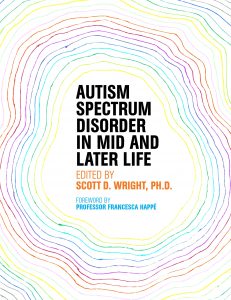During the month of April, we’re sharing a series of key extracts from some of our best and most popular books for autistic adults here on the blog. You may have already seen the extract from The Guide to Good Mental Health on the Autism Spectrum which we posted earlier. Next up in our series is Autism Spectrum Disorder in Mid and Later Life edited by Scott D. Wright, PhD.
most popular books for autistic adults here on the blog. You may have already seen the extract from The Guide to Good Mental Health on the Autism Spectrum which we posted earlier. Next up in our series is Autism Spectrum Disorder in Mid and Later Life edited by Scott D. Wright, PhD.
Bringing together a wealth of professional and academic research, alongside personal insights into aging and autism, Dr. Wright’s edited source book focuses on the challenges faced by individuals who have Autism Spectrum Disorder (ASD) and are middle aged or older.
The extract we’ve chosen and shared below is a first hand account of aging on the autism spectrum by Temple Grandin.
“When I was asked to do this chapter on autism and aging, the first thing that came
to my mind was that as I got older, my ability to think in a more flexible manner
improved. My mind is like a vast Internet of webpages. In the sixth decade of my life,
the database in my brain has more webpages containing memories of my previous
experiences than it had in the second decade. To understand how to react to a new
situation, I search my database to see how a new situation is either similar or different
compared with information stored in my memory. My thinking is bottom up, and in
my memory files I have memories of specific previous experiences. For example, on
my very first project, where my company was building equipment at a meat plant, I
criticized some poor welding and said it looked like ‘pigeon doo-doo’. The wise plant
engineer mentored me and told me I had to apologize to the welder for my tactless
comment. I apologized for the thoughtless words, but I did not praise the quality of
his welding. I learned to differentiate between rude, tactless comments and legitimate
concerns about welding quality. From this I learned that if I had a concern about
welding, I should have gone to the welder’s boss and stated the problem in more
diplomatic, technical language. I learned how to have better diplomacy to get a project
done correctly.”
To read the full chapter, CLICK HERE.
To find out more about this book visit our WEBSITE, or browse a selection of our books written for autistic adults HERE.
One thought